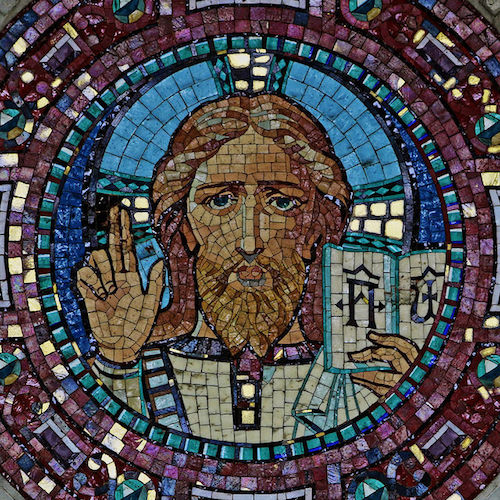We run our website the way we wished the whole internet worked: we provide high quality original content with no ads. We are funded solely by your direct support. Please consider supporting this project.

The Centrality of Christ in Hebrews, Part 1
The intense Christocentricity that the New Testament writers embrace is nowhere more clearly and consistently illustrated than in the book of Hebrews. Throughout this work we find a repeated emphasis on the many ways the revelation given to us in Christ surpasses that of the Old Testament. The author begins by stressing how the revelation of God in his own Son contrasts with and surpasses all previous revelations by virtue of the fact that the Son alone is the “radiance of God’s glory” and the “exact representation of his being” (Heb. 1:3). Consistent with this, the first ten chapters of this work are structured around Christ’s superiority:
- to angels, (1:5-2:18)
- to Moses (3:1-4:13)
- to the Aaronic Priesthood (4:4-7:28)
- to the High Priests and their sacrifices (chapters 8-10)
Reflecting this same perspective, the author sees the tabernacle erected by Moses to be a “copy” and “shadow” of the “true tabernacle set up by the Lord” (8:1-6). So too, the activity of the high priest on the day of the atonement in the OT was, for this author, the Holy Spirit’s way of “showing … that the way into the Most Holy Place had not yet been disclosed.” It thus serves as “an illustration (parabolē) for the present time” of the inferiority of the OT practices and the superiority of the sacrifice Christ makes and of the new covenant he brings (Heb. 9:8-28).
In the same way, the author of Hebrews held that “the law is only a shadow of the good things that are coming—not the realities themselves,” for the law could never “make perfect those who draw near to worship” (10:1). Only the sacrifice of Jesus—the reality to which the law and everything else in the OT points—can perfect people before God once and for all (10:10,14).
Given this perspective, we are hardly surprised to find this author discerning Christ in a wide array of OT passages. Let’s look at the opening chapter as a prime example. The author of Hebrews begins by interpreting the song that was sung at the coronation of a king (Ps. 2:7) to be a song about the enthronement of Christ (Heb 1:5). The author then goes on to demonstrate the superiority of Christ over angels by applying a reworked version of Psalm 104:4 to angels, showing them to be mere servants of Yahweh, while applying Psalm 45:6-7 to Christ, for this latter Psalm is a tribute to “God” whose “throne … will last forever and ever” (Heb 1:7-8).
And finally, to buttress Christ’s superiority over angels even further, this author goes on to apply to Christ a song about Yahweh’s work as Creator (Heb 1:10, cf. Ps 102:25-27). The circular way this author uses Scripture to prove Christ’s superiority simply reveals that he is approaching the OT with the assumption that it is a collection of works that is about Christ.
In the next post, we will explore a few more examples of how the writer of Hebrews puts Christ at the center of the Old Testament.
Photo credit: Leo Reynolds via Visual hunt / CC BY-NC-SA
Category: General
Tags: Bible Interpretation, Christocentrism, Cruciform Theology, New Testament, Old Testament
Topics: Christology
Related Reading

When God Endorsed Polygamy
We often find God acting as if he supports things we know, by other means, that he does not. For example, though his ideal was monogamy, it’s clear in the biblical narrative that, once God decided to permit men to acquire multiple wives and concubines, he was not above bearing the sin of his people…

How the Church is Tempted to “Do Good”
The previous post spoke of God’s call to the church to be resident aliens: a holy, distinct people who are set apart and peculiar when compared to the patterns of the world. The holiness of God’s kingdom is cruciform love, which constitutes our distinct witness to the world. Preserving this holiness and resisting the Devil’s…

Podcast: Is the Cruciform Hermeneutic a Little Too New?
Greg looks at the history of the Cruciform Hermeneutic. http://traffic.libsyn.com/askgregboyd/Episode_0446.mp3

Reflections on Divine Violence in the Old Testament
As some of you know, for the last five years I’ve been working on a book addressing the problem of divine violence in the OT. (For alleged violence in the NT, see Thomas R. Yoder Neufeld, Killing Enmity: Violence in the New Testament (Baker Academic, 2011). It will be a highly academic tome, approximately 600…

If Jesus Is the Whole Point, Then What’s the Point of the Old Testament? (podcast)
Greg considers the role of the Old Testament in Christian faith. Episode 554 http://traffic.libsyn.com/askgregboyd/Episode_0554.mp3

Thinking Biblically?
Olga Caprotti via Compfight Micah J. Murray over at Redemption Pictures posted this reflection called Beware of Thinking Biblically. The image of a google search on the topic is worth the price of admission. Christians throw around this phrase in some really damaging ways, as Rachel Held Evans demonstrated in her recent publication of A Year…
